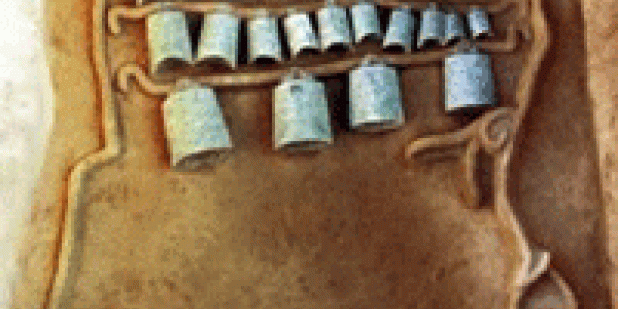Join us for a free one-day workshop for educators at the Japanese American National Museum, hosted by the USC U.S.-China Institute and the National Consortium for Teaching about Asia. This workshop will include a guided tour of the beloved exhibition Common Ground: The Heart of Community, slated to close permanently in January 2025. Following the tour, learn strategies for engaging students in the primary source artifacts, images, and documents found in JANM’s vast collection and discover classroom-ready resources to support teaching and learning about the Japanese American experience.
Western Zhou Bell Music in Texts and Archaeology
Haicheng Wang tells the stories of the ancient bronze bell sets unearthed in recent years.
Where

Thursday, November 15, 2007
TIME: 4:00 PM
Lampo Leong, Art Dept. Chair, University of Missouri-Columbia
This workshop is being held in conjunction with the exhibit, "Forces: Paintings and Calligraphy by Lampo Leong," which is showing from September 17 - December 14, 2007 at the IEAS Gallery, 2223 Fulton Street, 6th Floor, UC Berkeley.
Chinese classics of the last few centuries BC tell us that in the early first millennium BC Chinese civilization was the exclusive possession of the Zhou empire in north China. Zhou ritual music, we are told, was pentatonic; south China (i.e. the Yangzi region) was inhabited by barbarians playing strange music. But the bronze bell sets unearthed in recent years tell a different story. Zhou bell sets play a tetratonic scale. Moreover the Zhou seem to have obtained their first bells from musically and technologically more sophisticated centers in the south. The south was home to a civilization unknown to recorded history but increasingly visible in the archaeological record. Problems involved in reconstructing the history of Zhou music will be addressed.
Featured Articles
Please join us for the Grad Mixer! Hosted by USC Annenberg Office of International Affairs, Enjoy food, drink and conversation with fellow students across USC Annenberg. Graduate students from any field are welcome to join, so it is a great opportunity to meet fellow students with IR/foreign policy-related research topics and interests.
RSVP link: https://forms.gle/1zer188RE9dCS6Ho6
Events
Hosted by USC Annenberg Office of International Affairs, enjoy food, drink and conversation with fellow international students.
Join us for an in-person conversation on Thursday, November 7th at 4pm with author David M. Lampton as he discusses his new book, Living U.S.-China Relations: From Cold War to Cold War. The book examines the history of U.S.-China relations across eight U.S. presidential administrations.




